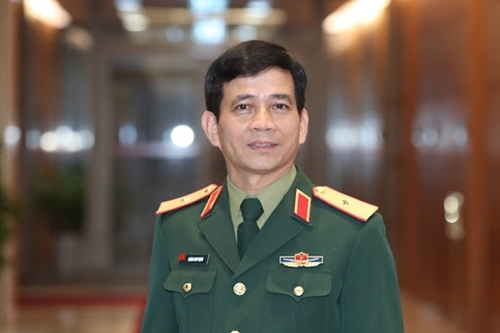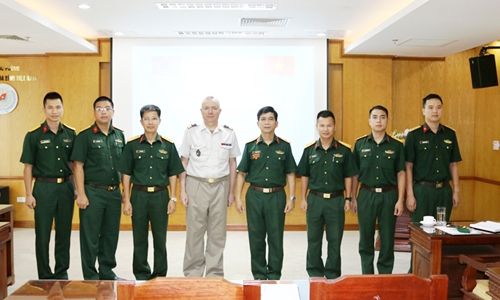General Phung, Director of the Vietnam Department of Peacekeeping Operations (VNDPKO) made that statement when talking about the fruitful cooperation of the two countries in the field over the past nearly ten years.
    |
 |
|
Major General Hoang Kim Phung |
Reporter: Vietnam and France have effectively cooperated in U.N. peacekeeping operations. What is the significance of this cooperation in Vietnam’s preparations of forces to participate in U.N. peacekeeping operations in recent years?
Maj. Gen. Hoang Kim Phung: Joining the U.N. peacekeeping operations right in the first years when the U.N. established its first peacekeeping mission in 1948, France has many years of experience in organizing and directing forces participating in U.N. peacekeeping missions. Moreover, France has an important voice in the U.N. General Assembly; therefore, France’s support for Vietnam’s preparations of forces to participate in U.N. peacekeeping operations is very important.
As of 2014, Vietnam was one of the three countries which had not had a U.N. peacekeeping force. The establishment of the Vietnam Peacekeeping Center (the forerunner of the VNDPKO) on May 27, 2014 captured much attention, support and cooperation from partner countries, including France. With great assistance from international friends, in June 2014, Vietnam dispatched two first officers to U.N. peacekeeping missions, a milestone demonstrating Vietnam’s direct engagement in settling global issues.
An important milestone in the bilateral defense ties between Vietnam and France was the signing of a technical agreement on U.N. peacekeeping cooperation by the MND and MAF in November 2016. The agreement is a legal foundation for the peacekeeping forces of the two countries in particular and the defense forces in general to clearly orient their cooperation in the field.
In Southeast Asia, a French experts’ group working in Cambodia visited Vietnam three times. The group collaborated with the Vietnam Peacekeeping Center to share experience with and train Vietnamese officers. The French side also updated the Vietnamese side with situations in South Sudan and the Central African Republic and shared their drawn lessons to help Vietnamese peacekeepers learn more about the areas of operation.
France also helped Vietnam solve problems within the scope of the relationship between the Vietnamese MND and the European Union (E.U.). With France’s support as a strong voice in the E.U., the then Minister of National Defense General Ngo Xuan Lich, on behalf of the Vietnamese Prime Minister, signed the Vietnam - E.U. framework agreement on Vietnam’s participation in the E.U.’s crisis management activities (FPA) in October 2019. At present, a French expert representing the E.U. is working at the VNDPKO to support the training programs and preparations for Vietnam’s U.N. peacekeeping force.
With support from partner countries, including France, and international organizations, Vietnam has sent three field hospitals and 55 officers operating independently to U.N. missions in South Sudan, the Central African Republic and U.N. headquarters.
It can be said that the cooperation in U.N. peacekeeping operations between France and Vietnam in recent years has become substantive and highly efficient, thus developing the bilateral defense ties in a sustainable manner.
    |
 |
|
Vietnamese officers in a working session with French partner |
Reporter: In terms of cooperation, both Vietnam and France have paid due attention to training courses to improve professional expertise and foreign language capabilities for the Vietnamese peacekeeping force. Could you please elaborate on that?
Maj. Gen. Hoang Kim Phung: Currently, the two countries’ cooperation in U.N. peacekeeping operations mainly focuses on professional training and exchange to improve capabilities of the Vietnamese peacekeeping force. It is important to raise the foreign language, military and professional skills of those to work at U.N. peacekeeping missions.
Last year, the two sides held six exchanges of professional expertise for the military engineering and medical forces and opened three French language courses at the VNDPKO. This is an encouraging cooperation result amid the complicated developments of the COVID-19 pandemic in the globe.
Additionally, according to the U.N.’s statistics, about 65 percent of personnel working at U.N. peacekeeping missions globally (currently 13) use French to communicate with local people and their colleagues. In other words, for U.N. peacekeeping forces, especially in African countries such as the Central African Republic and Mali, together with English, the use of the French language will greatly assist them in communicating, exchanging, collecting information, and working with the host country’s officials or solving emerging issues in the area.
Reporter: How will the two countries develop their cooperation in U.N. peacekeeping operations in the future?
Maj. Gen. Hoang Kim Phung: In my opinion, what should be strengthened is cooperation in personnel training, sharing of experience, knowledge, improvement of peacekeepers’ capacity. First, the training for the military engineers to be sent to a U.N peacekeeping mission should be paid attention to in the coming time.
Second, the two sides should together participate in seminars, conferences, forums, multilateral consultations on U.N. peacekeeping operations.
Third, French language training for Vietnamese peacekeepers will be boosted. In the short term, classes on the French language will continue to be opened for officers of the VNDPKO and then for military engineers and medical personnel engaging in U.N. peacekeeping missions and at the same time Vietnamese trainees will study French in France as well.
Finally, the two sides should accelerate the receipt of vehicles and communication equipment donated by France.
I believe that the cooperation between Vietnam and France in this field will be effective and more substantive in the future, contributing to ensuring the sustainability of the bilateral defense ties, and maintaining peace, stability in the region and the world.
Reporter: Thank you very much!
Translated by Mai Huong